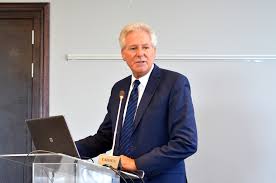By Byron Mutingwende
Multilingual education stands out as one way of promoting sustainable development and cultural diversity, it has emerged.
Speaking at a discussion forum held at the United Nations Information Centre in Harare Wednesday, 22 February 2017, Professor Hubert Gijzen, the United Nations Educational, Scientific and Cultural Organisation (UNESCO) Regional Director of Southern Africa said that education could be enhanced through access to local languages.
The discussion was held in light of the International Mother language Day, a day set aside by UNESCO in November 1999.
“On 16 May 2009, the United Nations General Assembly called upon Member States to promote the preservation and protection of all languages used by the people of the world. By the same resolution, the General Assembly proclaimed 2008 as the International Year of Languages, to promote unity in diversity and international understanding, multilingualism and multiculturalism. The day has been observed every year since February 2000 to promote linguistic and cultural diversity and multilingualism,”Gijzen said.
The UN official said that the preservation of local languages was of paramount importance.
“Language is a bridge between cultures as much as it is a tool for communication. Language expresses who we are; they structure our thoughts and identities. There can be no authentic dialogue or effective international cooperation without respect for linguistic diversity, which opens up true understanding of every culture.”
He added that access to the diversity of languages could awaken the curiosity and mutual understanding among people since learning languages promotes peace, innovation and creativity.
People’s cultures, ideas, feelings and aspirations are expressed through the first language. Mother languages convey values and visions of the world that enrich humanity.
The Director of Urban Communications in the Ministry of Media, Information and Publicity, Anyway Mutambudzi, said that there was need to enrich local languages so that they could be used in the teaching of crucial sbjects in schools like Mathematics and Science.
Mutambudzi said that in a globalised society, it was important to not only be communicative in the dominant language common across global communities but also preserve one’s cultural identity by retaining or learning one’s minority language.
Gijzen said that multilingual education had multiple roles. It enhances the quality of teaching and education; reinforces the cognitive aspect of learning by ensuring the direct application of learning outcomes; facilitates participation; speeds up the development of basic literary skills and builds a solid foundation of pupils during the early stages of their educational development.
Over and above that, multilingual education enables the full grasping of concepts, and ensures sustainable development as envisaged in SDG 4. 6 that seek to ensure that by 2030 all youth and a substantial proportion of adults, both men and women achieve basic literacy and numeracy.
In Zimbabwe, the Ministry of Primary and Secondary Education has concluded a curriculum review process and established a framework to guide implementation of the new curriculum.






